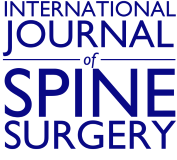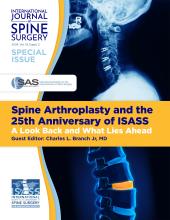Abstract
Background Full endoscopic spine surgery (FESS) champions a rapid recovery and a low rate of overall complications. However, its efficacy in geriatric patients that might yield additional benefits from minimized invasiveness remains underexplored.
Methods A multi-institutional prospective cohort study was conducted involving patients undergoing elective lumbar FESS. Participants were categorized into nongeriatric (18–69 years old) and geriatric (≥70 years old) groups. Studied variables included demographics, medical comorbidities, operative details, visual analog scale (VAS) for back and leg pain, and Oswestry Disability Index (ODI). A mobile application was leveraged to collect real-time data pre- and postoperatively.
Results One hundred and sixty-four patients were included and divided into nongeriatric (N = 125) and geriatric (N = 39) cohorts. No group differences were observed between sex (P = 0.404), body mass index (P = 0.372), procedure duration (P = 0.350), or blood loss (P = 0.384). Nongeriatric patients received discectomy more frequently (P < 0.001), while older patients underwent more decompressive procedures (P < 0.001). Characterization of pain and functional outcome revealed that nongeriatric and geriatric patients follow a similar recovery trajectory and both appreciate significant improvements from baseline to 3 months postoperatively (P < 0.001 for VAS back, VAS leg, and ODI). There were no differences in the rate of improvement between age groups at any time point (P > 0.05 for VAS back, VAS leg, and ODI).
Conclusions FESS significantly improves pain and function in both geriatric and nongeriatric adults with degenerative lumbar conditions, with no difference in the degree of improvement between groups.
Clinical Relevance These findings underscore the efficacy of FESS as a minimally invasive surgical option for elderly patients. Mobile application technology is useful for collecting patient-reported data in spine surgery clinical research.
Level of Evidence 3.
Footnotes
Funding The authors received no financial support related to this article.
Declaration of Conflicting Interests Dr. Derman reports prior speaking, teaching, and consulting for Joimax as well as teaching for Arthrex. Dr. Kashlan reports a teaching contract with Joimax. Dr. Ogunlade reports consulting for Arthrex and Elliquence. Dr. Konakondla reports being an educational consultant for Arthrex, Globus, and Spineology; receives royalties from Spineology; and receives honoraria from Joimax and Elliquence. Dr. Hofstetter reports personal fees from Innovasis, AO Spine, Joimax, Globus, and Kuros outside the submitted work. The remaining authors have nothing to disclose pertinent to this work.
Ethical Considerations This study was approved by a central IRB at the University of Washington (Study #05864) and individual participating center IRBs. Written informed consent was obtained for all participants. Study activities were performed in agreement with the 1975 Declaration of Helsinki.
Disclosure of Prior Presentations This work was previously submitted as an abstract to the Congress of Neurological Surgeons Annual Meeting.
- This manuscript is generously published free of charge by ISASS, the International Society for the Advancement of Spine Surgery. Copyright © 2024 ISASS. To see more or order reprints or permissions, see http://ijssurgery.com.







